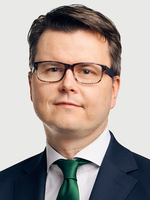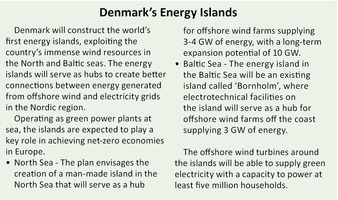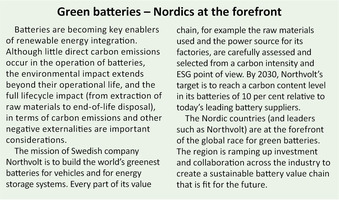
Alistair Welch, Head of International Units and Country Manager Ireland, Danske Bank: "As the Nordic countries continue to innovate and lead the way in sustainability, their economies are well advanced on the path to net zero emissions. At Danske Bank Dublin we are able to leverage the benefit of our Nordic heritage and bring that expertise to our corporate and institutional clients in Ireland as we actively partner with them on their own sustainability journeys."

Samu Slotte, Global Head of Sustainable Finance, Danske Bank
Transforming the global economy to net zero emissions will require a transition on the scale of the industrial revolution and at the same pace as the digital revolution.
The International Energy Agency (IEA) has estimated that the world needs to invest between USD 4 and 5 trillion every year between now and 2050 to achieve a net-zero economy. This will call for investment on an enormous scale, and the financial sector will play an important role in helping to raise the capital needed, and by ensuring capital is used constructively and allocated in line with 2050 net-zero ambitions.
Risks and opportunities
Investments and capital flows on this scale will offer historic opportunities for growth, innovation, job creation and commercial progress.
However, raising sufficient capital to support the sustainability transformation is only part of the challenge. It is equally important for financial institutions to manage risks stemming from the transition. Some assets and entire business models will no longer be compatible with a low carbon future. As well as scaling up financing of activities that are positive for the transition, banks need to reduce financing of harmful activities.
Striking this balance by carefully assessing risks and opportunities is what banks do, which is why the financial sector will play a crucial role as a catalyst for the green transition over the decades to come.
Growth of labelled green transactions
Since the first green bonds were issued in 2008, the market has grown exponentially, with over EUR 400bn in green bonds issued in 2022. Danske Bank is an active participant across the green finance market and ranks as a leader in global green bond league tables.
In Ireland, Danske Bank supports issuers such as the National Treasury Management Agency and ESB to issue award-winning green bonds, broadening their investor base to sustainability-focused asset managers and pension funds.
Danske Bank also issues green bonds, using the proceeds to on-lend to sustainable projects such as EirGrid’s Celtic Interconnector which will significantly improve the security of energy supply by linking the energy systems of Ireland and Europe. The interconnector will contribute to the European target for energy transition and climate change by integrating energy from renewable sources and enhancing the flexible exchange of power supply between Ireland and continental Europe. The funding of this development was the winner of Finance Dublin Loans & Financing Deal of the Year in 2023.
Biodiversity moving up the agenda
Biodiversity losses also put our economies at risk with over half of the world’s total GDP being moderately or highly dependent on nature and its services.
Looking at the financial sector in particular, pioneering research by the Central Bank of the Netherlands shows that 36% of Dutch financial institutions’ assets are exposed to biodiversity risk.
Whilst work on redirecting capital flows to activities that support the climate transition continues, I believe that 2024 will be the year when financial markets start to ramp up the focus on biodiversity. At Danske Bank we are actively analysing the impact and dependencies that our corporate loan portfolio has on biodiversity and expect to disclose data and targets by 2024.
Danske Bank’s Climate Action Plan
In Danske Bank’s Climate Action Plan, we disclose the carbon footprint of our own activities as well as the emissions associated with our lending and investment activities. The plan sets 2030 emission reduction targets for the highest emitting sectors in our loan book, namely shipping, oil and gas, power production, cement, and steel production as well as real estate.
For high-emitting sectors, we will measure the speed of companies’ transition using intensity indicators. For example, for power generation, by 2030, we will reduce the intensity of our lending portfolio by 50% from 72Kg to 36Kg of CO2 per MWh. This means that we will continue to finance the transition of companies that have set ambitious climate reduction targets but reduce our lending exposure to companies whose emission intensity is too high or are too slow to transition.
We regard our climate targets to be important tools to both redirect capital away from high carbon activities but also to manage the financial risks associated with the transition. We believe it is important for companies in high emitting sectors to set ambitious climate targets to continue to have access to financing.
In summary
The world of sustainability, sustainable finance and regulation is an ever-evolving landscape driven in Europe by the EU’s commitment to carbon neutrality by 2050. We see investors are shifting from analysing the sustainability merits of a single transaction to analysing the sustainability credentials of companies to ensure they are responsible stewards from an overall ESG perspective.
Exciting developments here in the Nordics include initiatives such as Denmark’s energy islands, significant investment by companies like Northvolt in green battery production, together with long-standing companies such as Copenhagen-headquartered Orsted which leads the way globally in offshore wind. Orsted and ESB recently announced an offshore wind partnership with the potential to deliver up to 5 gigawatts of renewable energy and complementary renewable hydrogen projects which will help decarbonise the Irish electricity system and enable future renewable energy exports to Europe.
The growing global push for sustainability presents a unique opportunity to generate significant economic growth while helping deliver on the global effort to combat climate change, and the Nordics and Ireland are well-positioned to capitalise on this. The effort must continue at pace across the globe, and our countries can set the example and lead the way to safeguard the futures of the generations to come.


